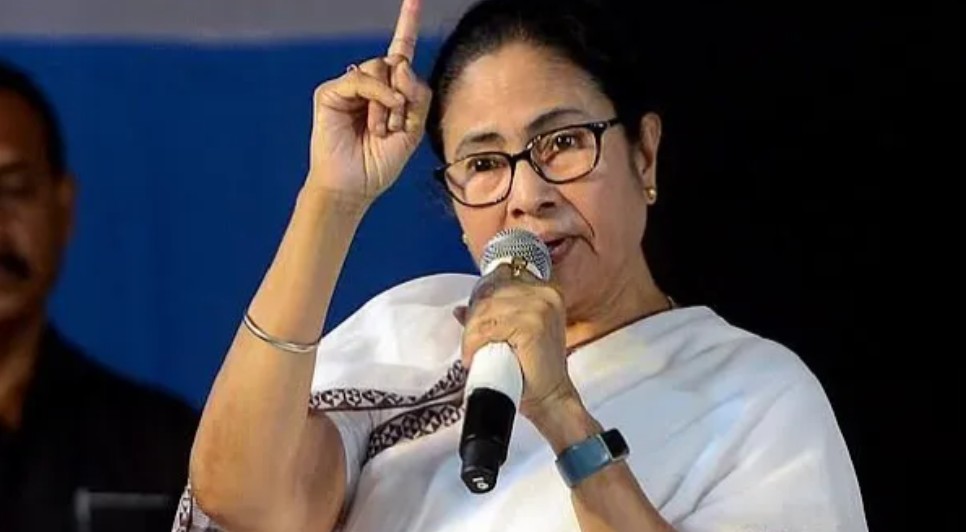Bengal CM Accuses Delhi Police of Insulting Bengali Identity, BJP Fires Back With NSA Threat
A fresh political and linguistic storm has erupted between West Bengal Chief Minister Mamata Banerjee and the Bharatiya Janata Party (BJP) over the alleged categorization of the Bengali language as “Bangladeshi” in a Delhi Police communication.
The controversy has reignited debates around linguistic identity, constitutional recognition, and what Mamata Banerjee describes as an “insult” to millions of Bengali-speaking Indians.
📌 What Sparked the Controversy?
- The dispute began on Sunday after Mamata Banerjee posted on X (formerly Twitter), accusing the Delhi Police of referring to Bengali as the “Bangladeshi language” in an official letter.
- The letter in question pertains to a case under the Foreigners Act and was reportedly sent to the officer-in-charge of Banga Bhawan, West Bengal’s government guest house in Delhi.
- Banerjee called the alleged remark “scandalous, anti-national, unconstitutional, and insulting” to all Bengali-speaking people in India.
🗨️ Mamata Banerjee’s Fiery Response
In her strongly worded post, Mamata Banerjee wrote:
“Bengali… our mother tongue… the language of Rabindranath Tagore and Swami Vivekananda… the language in which our national anthem and national song are written… is now described as a Bangladeshi language!”
She alleged this was an attempt to “debase and degrade” the Bengali identity and accused the Union Home Ministry, headed by Amit Shah, of being behind this linguistic profiling.
🔥 BJP’s Counterattack: “Misplaced & Dangerous”
Responding to Banerjee, BJP IT Cell chief Amit Malviya dismissed the CM’s outrage as “misplaced and dangerously inflammatory.”
Key points from Amit Malviya’s response:
- “Nowhere in Delhi Police’s letter is Bengali described as the national language of Bangladesh.”
- Accused Mamata Banerjee of “inciting linguistic conflict” and “calling on Bengalis to rise against the Centre.”
- Suggested she be charged under the National Security Act (NSA) for “destabilising” the nation.
Malviya explained that:
“‘Bangladeshi language’ is used as a shorthand to describe dialects, syntax, and speech patterns that are distinctly different from Indian Bengali — often used to identify illegal immigrants from Bangladesh.”
🧵 Trinamool Congress Hits Back: “Linguistic Apartheid”
The Trinamool Congress (TMC) responded sharply to Malviya’s justification, stating:
“Denying the existence of a constitutionally recognised language is nothing short of linguistic apartheid.”
The party accused BJP-led institutions of using “dangerous narratives” to systematically target Bengalis across India, promoting xenophobia and fostering a sense of “othering.”
🧠 The Bigger Debate: Language, Identity, and Politics
This isn’t the first time linguistic identity has become a flashpoint in Indian politics, but this row:
- Highlights deep-rooted cultural sensitivities around the Bengali language, spoken by over 97 million Indians.
- Raises questions about the use of language as a profiling tool in immigration-related cases.
- Exposes the shrinking space for regional identities amid rising nationalist rhetoric.
⚖️ What Does the Constitution Say?
- Bengali is one of the 22 languages listed in the Eighth Schedule of the Indian Constitution.
- It is recognized as an official language in several Indian states, including West Bengal and Tripura.
Any claim that downplays Bengali’s linguistic legitimacy can be seen as unconstitutional and culturally insensitive.
🗳️ Political Undertones Ahead of 2026 Bengal Polls
- This controversy comes at a time when Mamata Banerjee is ramping up for the 2026 West Bengal Assembly Elections, where BJP is her primary opposition.
- The language war could be a strategic move to galvanize Bengali-speaking voters by tapping into their cultural pride and regional sentiment.
🔍 Conclusion: A Cultural and Political Flashpoint
The ‘Bengali vs. Bangladeshi’ debate has opened up a deeply emotional issue for many Indians who identify strongly with their linguistic and regional heritage.
While the Delhi Police letter remains at the centre of scrutiny, the larger conversation now revolves around:
- The politics of identity,
- The dangers of cultural stereotyping, and
- The increasing weaponization of language in electoral strategies.
Also Read : “Were You There?”: Supreme Court Raps Rahul Gandhi Over China Remark



